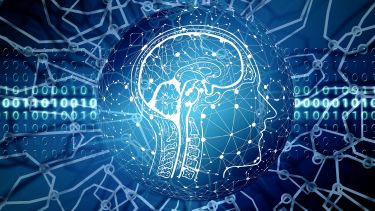Machine Learning
We explore and develop the capacity for algorithms to learn and make decisions and predictions from their environment. We follow a series of complementary approaches within the group, from biologically inspired computational models to probabilistic modelling and dimensionality reduction.

Research themes
- Bioinspired Machine Learning
Inspired by how biological systems learn and make decisions we are developing computational models of the brain's own learning mechanisms. This leads to impactful results in the areas of supervised, unsupervised and reinforcement learning, and vice versa to impactful results of machine learning in neuroscience. Importantly this field can provide deep insight into biological systems, from high-level complex behaviour (such as modelling the navigation systems of insects and mammals and applications to robotics) to modelling low level synaptic dynamics. Deep learning, for instance, is an example of a successful machine learning method loosely based on biological neural networks.
- Probabilistic Machine Learning
We develop probabilistic modelling techniques to produce predictions for ML challenges that require uncertainty quantification. In particular we look at using grey-box modelling approaches (such as Latent Force Models) for Gaussian process regression and classification, to allow efficient use of limited data. Other work includes developing approaches to provide differentially private predictions. Applications include temporal-spatial multi-fidelity modelling, gene-expression modelling, personalised medicine, air pollution sensor network calibration, differential-privacy and classifier robustness against adversarial-attack.
- Dimensionality Reduction
We have developed dimensionality reduction approaches for a variety of datasets in particular around medical imaging and computer vision recommender systems. The core approach is through the application of tensor analysis for dimensionality reduction allowing highly complex high-dimensional-tensor structures to be analysed. Examples include several video applications (e.g. for epileptic seizure detection) and the analysis of volumetric medical imaging
Core academic staff
- Prof Eleni Vasilaki (Head of Group, Professor of Bioinspired Machine Learning)
- Dr Zhixiang Chen (Lecturer)
- Dr Matt Ellis (Lecturer)
- Dr Robert Loftin (Lecturer)
- Prof Haiping Lu (Professor of Machine Learning)
- Dr Mike Mangan (Senior Lecturer, Sheffield Robotics)
- Dr Luca Manneschi (Lecturer)
- Dr Bei Peng (Lecturer)
- Dr Mike Smith (Lecturer)
- Dr Joab Winkler (Reader)
- Dr Shuo Zhou (Lecturer)
- Affiliated members
- Visitors
- Prof Neil Lawrence (University of Cambridge)
- Dr Mike Croucher (Mathworks)
- Dr Mauricio Alvarez (University of Manchester)
- Dr Dennis Wang (Imperial College London)
- Dr Aditya Gilra (CWI Amsterdam, Netherlands)
Seminar series
Discover more about Machine Learning from experts in the field. Our seminar series is open to the public. Seminar series
Software
GPy - An open-source framework for Gaussian Processes (GP) written in Python.
GPyOpt - An open-source library for Bayesian Optimization using GPy, written in Python.
Rodent Data Analytics (RODA) - A MATLAB suite of algorithms and a software for analysis and classification of rodents trajectory data in the Morris Water Maze.
PyKale - A PyTorch library that provides a unified pipeline-based API for knowledge-aware machine learning on graphs, images, texts, and videos to accelerate interdisciplinary research.
Sheffield Machine Learning Network
Our group coordinates the Sheffield Machine Learning Network. The aim of the network is to promote collaboration and to provide support for researchers and students who are working with or have interest in machine learning topics. It is open to anyone within the Sheffield University, and aims to foster an accessible environment. More details about the network are available.
